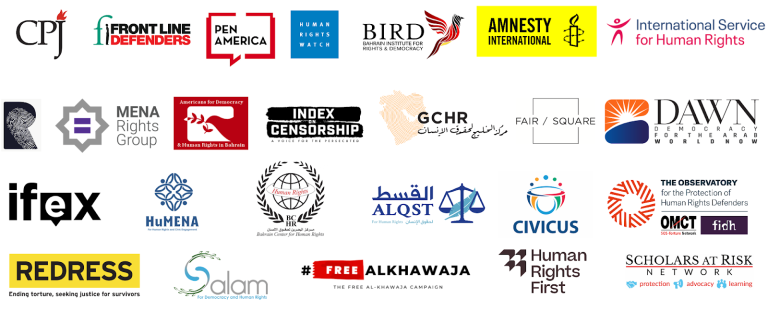31 October 2017 – The Bahraini authorities yesterday convicted three innocent family members of exiled human rights defender Sayed Ahmed Alwadaei in a show trial aimed at the suppression of his UK-based work. We, the undersigned, unequivocally condemn the arbitrary arrest, torture and unfair trial of Hajer Mansoor Hassan, Sayed Nizar Alwadaei and Mahmood Marzooq Mansoor and the reprisal against the work of Sayed Ahmed Alwadaei. We call for Hajer, Sayed Nizar and Mahmood’s immediate and unconditional release.
Sayed Ahmed Alwadaei, Director of Advocacy at the London-based Bahrain Institute for Rights and Democracy (BIRD), is the real target of this judicial harassment. Human Rights Watch condemned the sentencing as “collective punishment.” Yesterday’s convictions marks yet further reprisals against Hajer Mansoor Hassan, Sayed Nizar Alwadaei, and Mahmood Marzooq Mansoor, who are respectively Sayed Ahmed’s mother-in-law, brother-in-law, and cousin. All three were sentenced to three years in prison under Bahrain’s anti-terrorism law. Mahmood received an additional six weeks sentence and 100 Bahraini Dinar fine for possession of a dagger.
The court convicted the three individuals of – in the words of the official indictment – “plac[ing] and carry[ing] [sic] a model resembling the form of explosives” on a public road. The charge is based on the bizarre “fake bomb” provision of Bahrain’s counter-terrorism law, which reads: “Anyone who places or transports … models or forms resembling explosives, or capable of being believed to be explosives, shall be punished by imprisonment” (Art. 10, ¶ 3 of Law 58 / 2006 on the Protection of Society from Terrorist Acts, as amended by Law No. 20 2013).
According to the crime-scene report, which BIRD and ADHRB have reviewed, the case began when police forces “stumbl[ed] upon an unidentified object” along a public road, namely “an empty metal container … near to which was noted the presence of bits of cardboard carton with tape on them … and an electrical wire.” The authorities acknowledge that if the purported “fake bomb” even existed, it appeared to be nothing more than litter.
Moreover, the initial report of the “unidentified object” is dated 28 January 2017. This means that police waited over a month to detain Hajer, Sayed Nizar, and Mahmood as suspects in early March – timing which, UN human rights offices have noted, happened to “coincide with Mr. Sayed Ahmed[’s] attendance of the 34th session of the United Nations Human Rights Council,” where he voiced criticism of the Bahraini government.
Bahrain’s Ministry of Interior (MOI) has provided no indication as to why they made the arrests at this time, as the police forensic labs reported that the crime-scene samples sent to them were “negative as to human [DNA] cells” and “contained no traces of fingerprints.” In short, there is no physical evidence linking the victims to the non-incident. The police also fail to explain why Hajer, who is 49 years old and cares for two children and her 90-year-old mother, would plant a “fake bomb.” Notably, several months earlier, in October 2016, Bahraini security officers explicitly threatened Sayed Ahmed’s wife, Duaa, that they would “go to [her] family” in pursuing their reprisal campaign against her husband.
The prosecution’s argument is prima facie non-credible, from the statute to the charges to the “evidence.” Bahrain’s anti-terror legislation effectively grants the authorities license to arrest anyone linked to an object that the police claim resembles a bomb – although in this case the defendants are not even physically linked to the item in question.
“The ‘fake bomb’ charge is absurd, and these proceedings show how far Bahraini courts are willing to go to in jailing innocent people,” said Husain Abdulla, ADHRB’s Executive Director, “The United States has encouraged this behavior. When the Trump administration drops human rights conditions and approves multi-billion dollar arms deals to Bahrain, they are saying that they are willing to ignore these abuses. Bahrain’s western allies cannot and must not turn a blind eye.”
Sayed Ahmed Alwadaei, Director of Advocacy at BIRD, said: “The lowest the Bahraini monarch can go is to come after my family because I protested his presence in the UK and dedicated my work to exposing his government’s horrific rights abuses. I was distraught to see my family suffer torture, persecution and interrogations about my activities. The judge relied on coerced confessions extracted under torture to convict them. I will not rest until they are freed and will do whatever I can to hold the perpetrators to account.”
While in the government’s custody, the Alwadaei family members were subjected to ill-treatment which in some cases amounted to torture. Mahmood and Sayed Nizar were beaten; Sayed Nizar was stripped and threatened with sexual assault; and Hajer was forced to remain standing under hours-long interrogation until she collapsed and had to be taken to hospital.
BIRD has attempted since August to have the MOI Ombudsman investigate the defendants’ accounts of ill-treatment, but the office has steadfastly refused to take up this issue. A complaint was submitted on 9 March 2017 to Bahrain’s Special Investigation Unit (SIU) on behalf of Hajer. On 13 March 2017, Hajer attended an interview at the SIU building. In September 2017, her attorney was informed that the SIU had closed the case. The SIU refuses to disclose any details of its alleged investigation. Both the Ombudsman and SIU have failed to uphold international standards of torture investigation as set out in the Istanbul Protocol, namely in failing to conduct prompt and impartial investigations and failing to keep the victims of torture and their legal representatives informed of the findings of the investigation.
Medical reports by state doctors contained in the prosecution’s files record various “scrapes,” “abrasive injuries,” and “discolorations” on the bodies of Mahmood and Sayed Nizar. The medical report on Hajer records a needle puncture mark from her time in the hospital.
The defendants have largely been denied access to legal counsel throughout the proceedings. All three were questioned by the Criminal Investigations Directorate (CID), a division of the Bahraini MOI which is consistently responsible for torture in Bahrain (including in this case), without lawyers present. When Hajer asked to see her lawyer, the interrogators replied that they would “hang him from the flagpole” in front of the CID building if he tried to enter.
Such grave violations in the course of a prosecution render the legal proceedings, and any judgment issuing from them, null and void. Reliance on confessions extracted by torture or ill-treatment is prohibited by the Convention Against Torture (Article 15), to which Bahrain is a party, “except [as evidence] against the torturer,” in the words of the treaty’s monitoring committee. The right to free communication with a lawyer, in addition to being guaranteed by international instruments joined by Bahrain – such as the International Covenant on Civil and Political Rights, Article 14.3(b) – is guaranteed in Bahrain’s own constitution (Article 20(e): “Everyone accused of a felony must have a lawyer to defend him”) and the Arab League’s Charter on Human Rights, which is in fact more specific than the International Covenant, guaranteeing the defendant’s right “to communicate freely and confidentially” with a lawyer of his or her choosing (Article 16.3).
Just days before her conviction, on Friday, 27 October, Hajer again required hospital treatment due to the health implications of a hunger strike undertaken by women detainees to achieve more humane conditions in Isa Town Women’s Prison, beginning on 24 October. Other women imprisoned at Isa Town expressed severe worries over Hajer’s “extremely poor” health. The episode further raises fears about the effects of long-term imprisonment on Hajer’s well-being, though the essential point remains that she, Sayed Nizar and Mahmood are arbitrarily, unlawfully detained and must be released immediately. The women detainees ended their hunger strike after six days on 29 October, after the prison administration agreed to meet their demands.
A coalition 16 of international human rights NGOs recently issued an open letter to eleven states calling for international action to halt this judicial persecution, which is clearly aimed at Sayed Ahmed Alwadaei. Forty Members of the European Parliament also wrote to the European External Action Service and 27 British MPs to the Foreign Secretary Boris Johnson urging action ahead of the trial. The United States State Department also called for a thorough and impartial investigation into the allegations of abuse. As he is out of the reach of the Bahraini government, it has instead targeted his family members still in the country. As Amnesty International has extensively documented, reprisals against the families of human rights workers is increasingly a tool used by the Bahraini government.
We, the undersigned, condemn yesterday’s court decision in the strongest possible terms and the reprisal against the work of BIRD’s Director of Advocacy, Sayed Ahmed Alwadaei, and call on the Government of Bahrain to immediately release and drop all charges against Hajer Mansoor Hassan, Sayed Nizar Alwadaei, and Mahmood Marzooq Mansoor. Urgent diplomatic action, especially from Bahrain’s key allies, the US and UK, is needed to halt these abuses and to see all victims of the Bahraini government’s reprisals freed without delay.
Signed,
Americans for Democracy & Human Rights in Bahrain
Bahrain Institute for Rights and Democracy
European Centre for Democracy and Human Rights





